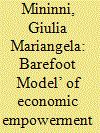| Srl | Item |
| 1 |
ID:
152041


|
|
|
|
|
| Summary/Abstract |
Social and cultural constraints in remote rural areas alienate women and limit their human development. However, there is potential for engagement in educational and economic activities to support their empowerment and the achievement of wider development goals. I discuss the case study of the Barefoot College from India where illiterate women have been involved for over 20 years in training in small-scale solar energy technology solutions. I argue that the participation in the solar program has the potential to support women’s ‘effective’ and ‘transformative’ empowerment, as my sample demonstrates. Through the training, poor women have the opportunity to have an income, learn new skills and foster employment opportunities. The engagement with the organization also supports raising their awareness and enables them to become agents of change. By challenging intra-household dynamics and societal customs, women pursue greater empowerment. Due to its unique model, the training program that started in rural Rajasthan scaled up internationally and has been replicated in several countries in south-east Asia, Africa and Latin America.
|
|
|
|
|
|
|
|
|
|
|
|
|
|
|
|
| 2 |
ID:
127807


|
|
|
|
|
| Publication |
2013.
|
| Summary/Abstract |
In societies with widespread gender discrimination, development programs with gender quotas are considered a way to improve women's economic, political, and social status. Using a randomized field experiment across 500 Afghan villages, we examine the effects of a development program that mandates female participation. We find that even in a highly conservative context like Afghanistan, such initiatives improve outcomes specific to female participation in some economic, social, and political activities, including increased mobility and income generation. They, however, produce no change in more entrenched female roles linked to family decision-making or in attitudes toward the general role of women in society.
|
|
|
|
|
|
|
|
|
|
|
|
|
|
|
|